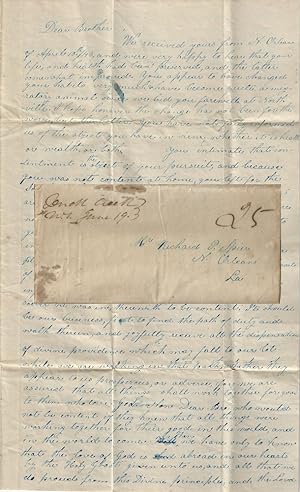Henry Root Colman (1 results)
Product Type
- All Product Types
- Books (1)
- Magazines & Periodicals
- Comics
- Sheet Music
- Art, Prints & Posters
- Photographs
- Maps
- Manuscripts & Paper Collectibles
Condition
Binding
- All Bindings
- Hardcover
- Softcover
Collectible Attributes
- First Edition
- Signed
- Dust Jacket
- Seller-Supplied Images (1)
- Not Print on Demand (1)
Free Shipping
- Free US Shipping
Seller Location
Seller Rating
-
1843 - Letter from an important missionary at the Oneida Duck Creek Reservation in Wisconsin describing his effort "endeavoring to labor for the good of the Indians."
Published by Duck Creek Reservation, Wisconsin, 1843
Seller: Kurt A. Sanftleben, LLC, Virginia Beach, VA, U.S.A.
Envelope or Cover. Condition: Very good. This three-page stampless letter measures 15½" x 12½" unfolded. It was sent by Henry Root Colman to his brother-in-law, Richard P. Speir, who had recently settled in New Orleans. It is datelined "Duck Creek June 17th 1843" and bares a manuscript postmark reading "Duck Creek / W.T. June 19" and a "25" rate mark. In this letter, Colman explained, "An Indian Missionary does not see much of the world or have the privilege of sharing very largely in the blessings of civilized life. But all this we expected before we came here. We have been and are still endeavoring to labor for the good of the Indians. We have had some success among them but have not as yet seen any general outpouring of the spirit in the awakening and conversion of souls. We hope however to soon sow the seeds which may yet produce a plenteous harvest by the blessing of the Lord. . . "We have had an unusual cold long winter which has produced a great scarcity in bread stuffs [and] some of the Indians have suffered very much. They have obtained a temporary supply. They have brought in enough to Green Bay since navigation opened but the difficulty is to get cash to buy with. The cold season and scarcity of bread stuffs makes the Indians very uneasy and discontented. There is much talk among them of removing to Missouri. Whether they will ever start or will get there if they should set out time alone will determine. I am trying to teach school this summer . . . and farm . . . while I preach to the Indians and visit among them. . ." It is also clear that the Colmans were worried about Spier. "You appear to have changed your habits very much, & have become quite a migratory animal since we bid you farewell at Northville. I hope however, the change has not been for the worse. . . You intimate that contentment is the object of your pursuit, and because you was not content at home, you left for the South in hope to find it there . . . yet there is one thing that we have all lived long enough to prove & that is, that contentment is not a plant of foreign growth, but it flourishes in the breasts of all who cultivate, and nourish it. . . We hope dear Brother that you will not rashly expose your life & health for the sake of gain in the swamps of Louisiana. May the good Lord direct your way. . . if you are in search of health why . . . breathe the Miasma of the south? If you will come to Wisconsin you may enjoy as healthy a climate as there is to be found under the Sun. . ." . Between 1795 and 1845, the State of New York unconstitutionally imposed over 20 treaties upon the Oneida Nation that stripped it of hundreds of thousands of acres as federal courts claimed they were powerless to prevent the theft. In response the federal government granted the Oneida 300,000 acres of land and a significant portion of the tribe began to move to Wisconsin where the Duck Creek Reservation was eventually established near Green Bay in 1838. The "unusual cold long winter," known for years as the 'hard winter' reported by Colman was, indeed, devasting to both crops and wildlife; the ground remain covered with two feet of hard-crusted snow through March and nearly caused the extinction of wild turkey in the region. Henry Colman had been an itinerant Methodist Episcopal preacher in New York when he relocated with his family to Duck Creek in 1840. After five years of ministering to the Oneida, the family relocated to the Brotherhood Indian Nation at Fond du Lac where Christian members of the Mohegan, Pequot, Niantic, Narragansett, Montauk, and Tunxis peoples had migrated during the Great Awakening in the mid-1700s after becoming dissatisfied with the moral corruption prevalent among white New Englanders. There, he also ministered to the white population until overtaken by ill health. In 1847, Colman received a $10,000 grant to establish a college (today Lawrence University) at Appleton, across Lake Winnebago from Fond du Lac, from the noted Massachusetts Episcopalian reformer and philanthropist, A.


